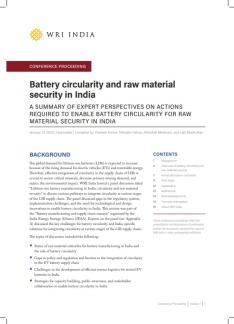Battery Circularity and Raw Material Security in India
The global demand for lithium-ion batteries is rising due to EVs and renewable energy, making battery circularity crucial for securing raw materials and reducing environmental impacts. WRI India hosted a panel discussion titled “Lithium-ion battery manufacturing in India: circularity and raw material security” as part of the Battery manufacturing and supply chain summit organized by IESA. The panel examined regulatory gaps, implementation challenges, and the need for technological innovations to enable circularity in the LIB supply chain.

The global demand for lithium-ion batteries (LIBs) is expected to increase because of the rising demand for electric vehicles (EVs) and renewable energy. Therefore, effective integration of circularity in the supply chain of LIBs is crucial to secure critical minerals, decrease primary mining demand, and reduce the environmental impact. WRI India hosted a panel discussion titled “Lithium-ion battery manufacturing in India: circularity and raw material security” to discuss various pathways to integrate circularity at various stages of the LIB supply chain. The panel discussed gaps in the regulatory system, implementation challenges, and the need for technological and design innovations to enable battery circularity in India. This session was part of the “Battery manufacturing and supply chain summit” organized by the India Energy Storage Alliance (IESA). Experts on the panel (see Appendix A) discussed the key challenges for battery circularity and India-specific solutions for integrating circularity at various stages of the LIB supply chain.
